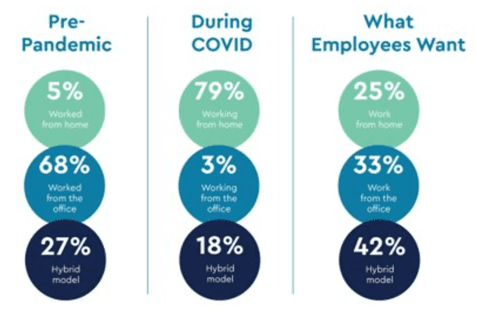
Before 2020 good knowledge management [KM] simply didn’t exist for many organizations. In most cases, people turned to the ‘office encyclopaedia” - the colleague who always has the answers on various topics or at least knew who, where (and in which system) to find them. Then the world changed. As we all worked from home the stream of information became reliant on the available digital tools [if there were any] and trying to make contact with the encyclopaedic colleague and inundate them with questions. As the pandemic continued, organizations began thinking this new normal is here to stay and asking themselves “If we had had good KM practices and tools in place, the crisis may not have been so impactful on the organization and its operations” – hindsight is a wonderful thing.
For many companies the last two years has been a time of discovery, reinvention and reimagining the way we work. What we thought was a short term “means to an end” or experiment, has now become the future of work, and it’s very clear that employees want a hybrid model of working.

APQC (American Productivity & Quality Center) is the world’s foremost authority on benchmarking, best practices, process and performance improvement, and knowledge management. APQC’s research shows good KM will; make it easier to support remote and hybrid workers, build collaborative relationships with suppliers and customers, on-board and upskill new hires, and retain valuable knowledge despite turnover. They say executives are beginning to recognize knowledge as a strategic asset that needs to be protected and managed, whether that’s documented knowledge assets or what exists in people’s heads.
Remote work, by its very nature creates additional complexity to the flow of knowledge — people, information, and resources become both physically and digitally dispersed, making it difficult for others to easily locate and acquire information.
Tacit knowledge, learned with experience over time, is even harder to capture and share across dispersed teams. The flow of knowledge from colleague to colleague, not only boosts productivity but also supports learning. The loss of casual collaboration, along with the increased time and effort it takes to track down information, can cause remote employees to disengage.
In a customer service world for example - disengagement by agents will lead to poor job performance, and probably a high turnover rate. A high turnover rate will weaken the team’s knowledge base and ultimately its ability to look after customers well. It will cut into productivity, and ultimately the bottom line.
The key question is, in a world of remote and hybrid work how can organizations digitally enable the sharing of knowledge, empowering employees to do their jobs effectively and efficiently. Video conferencing and instant messaging are great for communication, but are not designed to facilitate knowledge sharing – you really need to be looking at a cloud based knowledge management system like Knowledge IQ
So it seems like now is a defining moment in the nature of work, and in order to avoid that ‘hindsight’ discussion it’s the ideal time to review your KM requirements.
Apart from remote working below are 3 more major challenges to providing exceptional knowledge management.
Knowledge in silos remains a problem for many businesses or enterprises that are not digitally savvy. The consolidation of data that is spread across multiple channels is a significant challenge to progress and digital transformation.
"Siloed, inaccessible knowledge creates operational risk and leads to duplication of effort” say APQC. Even more so, with the explosion of communication platforms across today's remote or hybrid workplace.
Remote working shrinks employee networks as they prioritize communicating with their closest teammates and engage less with colleagues they do not work with regularly. Ultimately, the lack of information sharing between departments and teams creates a harmful silo effect that lessens productivity and supresses innovation.
Use a knowledge management platform like Knowledge IQ and give ownership and confidence to everyone by centralising your sources of information and content creation.
Not surprisingly, the sheer amount available information is becoming more of a problem for employees today. Employees are increasingly frustrated by chaotic, disorganized information repositories. They have too many places to look, too much stuff to sort through.
Information pollution contributes to information overload and stress and therefore disrupts decisions. Increased processing time easily translates into loss of productivity and revenue. Flawed decision making increases the risk of critical errors
To identify the correct information you’ll need a KM platform that has
A business process can take many forms. Simply, they are a series of repeatable steps you would need to take in order to achieve a business goal. They are the backbone of any business and documents such as checklists, procedures, policies, forms, tutorials, and links to other applications all help to support the business process. Having well formulated processes in place will;
Processes keep operations from devolving into complete chaos. If you don’t have processes in place the effect could be devastating. You’ll miss opportunities to meet customer expectations and lose potential business.
With Knowledge IQ you can visualise and step through processes to perform repetitive tasks electronically and to eliminate the need to pass documents hand-to-hand among remote workers.
If there was ever a time to make changes and improvements to your KM capabilities - it's now! We're here to help and our dedicated people ready to talk.
Want to know more about how KnowledgeIQ can support your business contact the team for a personalized demo. Request your FREE demo